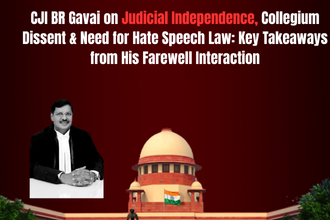The Supreme Court of India on Friday sought a response from the Enforcement Directorate (ED) in a petition filed by Chaitanya Baghel, son of former Chhattisgarh Chief Minister Bhupesh Baghel, challenging his arrest in the alleged ₹2,000 crore liquor scam case. The case marks another high-profile confrontation between political leadership and federal enforcement agencies in financially sensitive and politically charged investigations.
A Bench of Justices Surya Kant and Joymalya Bagchi issued notice to the ED and directed it to file a counter affidavit within ten days. The Court also raised pertinent questions concerning the timeline and legality of the ongoing investigation, particularly in light of the Bharatiya Nagarik Suraksha Sanhita (BNSS), 2023, which replaced the CrPC.
Background of the Case
The liquor scam pertains to allegations of a large-scale manipulation of liquor licensing, pricing, production, and distribution between 2019 and 2022 in Chhattisgarh. The alleged scheme reportedly caused losses to the State exchequer and created illegal profits laundered through shell companies and real estate transactions.
The ED contends that Chaitanya Baghel played a role in laundering proceeds of crime linked to the scam. His arrest is being challenged as:
- Illegal,
- Arbitrary, and
- In violation of due process under the Prevention of Money Laundering Act (PMLA).
Supreme Court’s Observations
During the hearing, Justice Bagchi noted:
“More than grounds of arrest, it’s about the interpretation of Section 190 (BNSS, 2023). How long can you take to investigate?”
This is significant because Section 190 BNSS deals with the stage at which courts can take cognizance of an offence, and the Court appeared concerned about endless investigations prolonging custody.
The ED, represented by Additional Solicitor General (ASG) SV Raju, responded:
“This court gave me time to complete the investigation in 3 months.”
The Court, however, insisted on reviewing the justifications behind the extended custody and investigation timeline.
Arguments on Behalf of Chaitanya Baghel
Senior Advocates Kapil Sibal and N Hariharan, appearing for Baghel, contended that:
1. Arrest Was Made Without Notice
Baghel was allegedly arrested on grounds of non-cooperation.
However, Sibal argued:
“They never summoned me. They never called me. They arrested me under Section 19 PMLA, which they cannot do without issuing notice.”
Section 19 of PMLA empowers ED officers to arrest if they have reason to believe involvement in money laundering. The defense argues that such belief must be preceded by procedural fairness, including prior summons.
2. The ED Is Prolonging Custody by Delaying Trial
Hariharan stated that continuation of investigation without seeking court permission has led to unending pre-trial detention, which violates fair trial rights under Article 21.
Sibal emphasized:
“They file complaints but never take the trial to start. This way, the trial never begins, and custody continues.”
To this, Justice Surya Kant remarked:
“You’ll have to respond. Non-cooperation is not the only ground, but these allegations require examination.”
High Court Order Challenged
Earlier, the Chhattisgarh High Court dismissed Baghel’s plea, ruling that although the ED continued its investigation without mandatory judicial permission, it amounted only to a procedural irregularity, not illegality.
Baghel’s current plea argues the opposite:
- Procedural irregularities can invalidate the investigation,
- Rendering the arrest unlawful, and
- Violating constitutional protections.
Challenge to PMLA Provisions: Sections 50 and 63
In a separate petition, Baghel has also questioned the constitutional validity of:
| Section | Provision | Contested Reason |
|---|---|---|
| Section 50, PMLA | Empowers ED to record statements compelling appearance and answers | Allegedly violates Article 20(3) (right against self-incrimination) |
| Section 63, PMLA | Penalizes false information or failure to supply information to ED | Allegedly violates Articles 14 & 21 (unequal treatment & due process) |
The petition argues that statements given under compulsion are later treated as confessional evidence, unlike the protections available under the Code of Criminal Procedure.
This brings the debate back to the Supreme Court’s 2022 judgment in Vijay Madanlal Choudhary, where PMLA provisions were largely upheld—though concerns of coercive questioning and absence of procedural safeguards remain under constitutional scrutiny.
Key Legal Questions Before the Supreme Court
- Was the arrest under Section 19 PMLA lawful without prior summons or notice?
- Can continued investigation without judicial approval invalidate the process?
- Does prolonged custody without trial violate Article 21 (Right to Life and Liberty)?
- Do Sections 50 and 63 PMLA violate the right against self-incrimination?
- What is the permissible duration for investigation under BNSS 2023 before it becomes unconstitutional?
Political and Legal Implications
This case is politically sensitive given the stature of the Baghel family and the timing amid broader nationwide debates on:
- Role of ED in political cases
- Preventive detention vs. fair trial rights
- Misuse of financial crime laws
- Judicial oversight on enforcement agencies
The Supreme Court’s decision will likely influence:
- Future PMLA arrest protocols,
- Investigative timelines, and
- The balance between state power and individual liberty.
Conclusion
The Supreme Court’s decision to seek ED’s response signals judicial willingness to examine procedural fairness in high-profile enforcement cases. While not indicative of guilt or innocence, the Court’s questions reflect growing concerns around arrest-first-investigate-later practices under PMLA.
The final ruling will have significant consequences for:
- Criminal procedure under BNSS 2023,
- PMLA enforcement standards, and
- Constitutional protections in financial crime investigations.
Also Read


